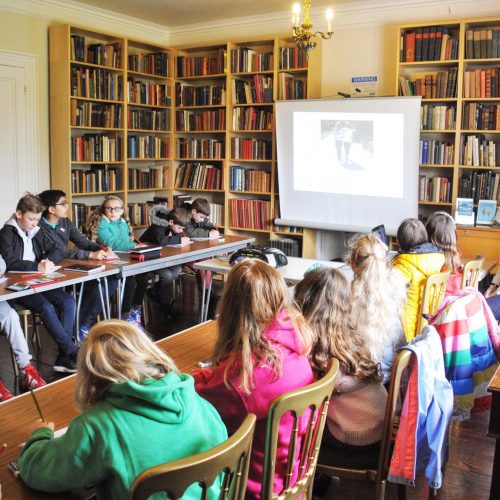Working with writers has the potential to improve the enjoyment, attitudes and confidence of pupils and teachers in both reading and writing, according to National Literacy Trust research.

Data collected by the National School Library Survey, along with National Literacy Trust’s annual survey reveals some interesting insights into the benefit of children working with writers at their school.
Of the 1,750 primary and secondary schools surveyed, 3 in 5 said they had had a visit from a writer in the past year. Of these, 79% said this was to support reading for pleasure, 67% cited encouraging creative writing as a reason and 47% organised an author visit in order to support the English curriculum.
From the children’s perspective, an author visit to their school seems to have had an impact on their reading and writing behaviour.
According to reading skill data from 712 participating children and young people, those who benefited from a writer visit have, on average, higher reading scores than those who didn’t have such an experience. These children were more likely to read above the expected level for their age compared with their peers who didn’t have a writer visit.
Reading and writing enjoyment levels were also found to be higher among those who had a writer visit their school.
More children and young people attending independent schools (54.7%) reported having had a writer visit compared with children and young people in state schools.
A report published by the All-Party Parliamentary Writers found:
“Authors said that some schools commission fewer visits due to budgetary constraints, even when these visits can be part of a varied and interactive education.”
With school budgets being so constrained, it seems state schools are more likely to see working with professional writers as a ‘nice to have’ or an extracurricular activity. In other words, something more likely to be cut when finances are tight.
Demographically, the North East and the South West, are areas where pupils were most likely to have worked with writers.
These regions are among the highest performing for reading and writing at KS2 according to DfE data. In particular, in the South West, where there has been a targeted intervention using writer residencies, there has been a significant improvement in writing for the Year 6 age group.
There are clearly longer-term opportunities for children who work with writers.
If you’re a school who has organised for a writer to come for a one-off visit, preparation is key.
Writer visits are found to be most effective when the children prepare for the visit in advance, for example by reading the author’s book or writing a first draft of a poem to be worked on during the session. When teachers or librarians communicate with the writer in advance, they can also agree on a focus for the visit. This will also allow teachers to build upon the content of the visit after the event itself.
Are you a teacher who has organised an author visit to your school? Are you a student who has benefited from working with a visiting author, or an author who regularly works with schools? Tell me about your experiences.

0 Comments